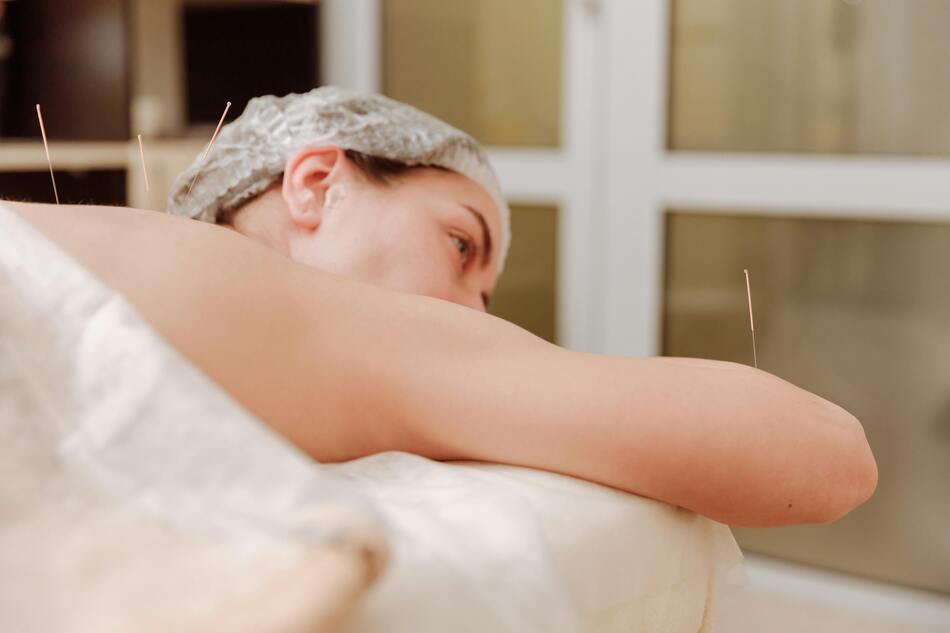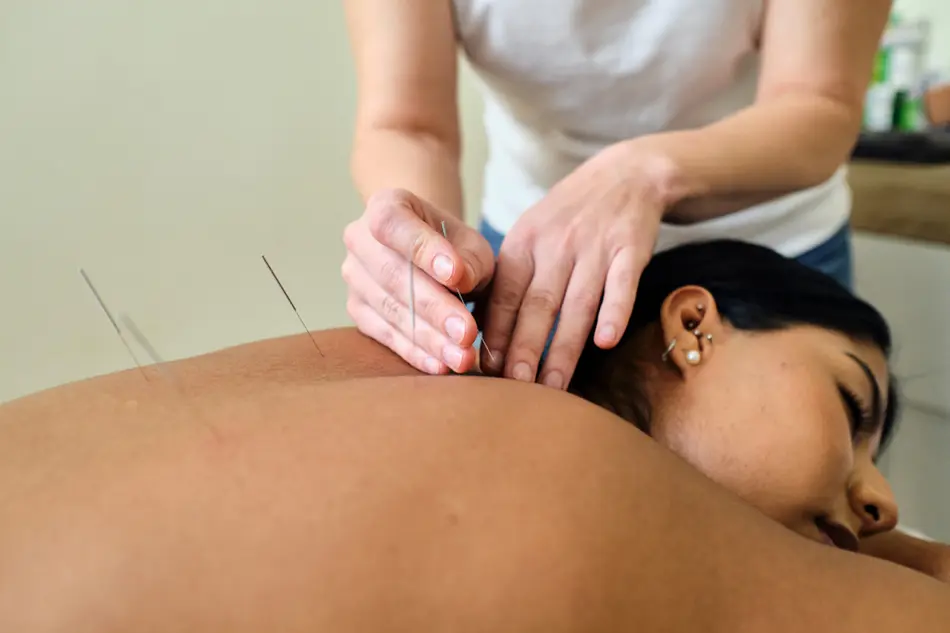Acupuncture has been practiced for thousands of years, which should be enough proof that the short- and long-term benefits of acupuncture have been well-understood for just as long. However, in the West, many people are still skeptical.
This kind of therapy is still in the process of entering the mainstream zeitgeist and being truly accepted as a valid method of holistic treatment. People often question: does it really work? And if so, what can it help with?
At the end of the day, it’s good to be skeptical and pose many questions – so long as you are willing to listen objectively to the answers. So, let’s together discuss everything you could wish to know about the benefits of acupuncture. But, before we get to that, we should start with the basics.
How Does Acupuncture Function?
Acupuncture is the practice of inserting very fine needles into acupoints – specific areas that constitute your body’s focal points. From a traditional perspective, in simplistic terms, these acupoints are the energy centers of your body and acupuncture helps free the flow of energy.
From the perspective of Western medicine, manipulating acupoints stimulates your body to release beneficial chemicals, like endorphins or serotonin, which help with healing. In addition, there are several types of acupuncture. The differences between them lie in: (1) how deep the needles are inserted; (2) whether they are manipulated once inside your skin; and (3) where the needles are applied.
For instance, traditional Chinese and Japanese acupuncture involves inserting acupuncture needles across your entire body. However, while Chinese practice includes deeper insertions and needle manipulations, Japanese acupuncture applies shallow thrusts and does not involve needle manipulation. Conversely, traditional Korean acupuncture focuses only on the hands and feet.
When it comes to modern acupuncture, the practices are as diverse as the acupuncturists; this diversity typically includes amalgamations of traditional and modern principles. With that said, the foundation is always the same, regardless of the tradition – the insertion of fine acupuncture needles underneath your skin.
Now, let’s discuss the short and long-term benefits of acupuncture.
Pain Management
One of the most well-known benefits of acupuncture is short-term pain relief. Acupuncture can be used to manage any type of musculoskeletal pain, from sports injuries to chronic conditions like arthritis. The fact that acupuncture can help with pain relief is not truly debated and, luckily, it’s easily tested.
You can always go to an acupuncturist and see for yourself whether the treatment helps. What is debated in the medical community are the long-term benefits of acupuncture for pain management. But even that debate should be put to rest thanks to a study published in the Journal of Pain, the official journal of the US Association for the Study of Pain.
In short, a meta-analysis of individual patient data from randomized trials was conducted (the analysis included 20,827 patients from 39 clinical studies) and the conclusion was, and is, that acupuncture therapy is an effective treatment for long-term chronic pain, with the caveat being that there is a 15% drop-off in the effectiveness after one year.
And when the positive effects subside, you can always get another acupuncture session. Not a bad deal, right? So, the benefits of acupuncture are both short and long-term pain management.
But Is It Simply a Placebo Effect?
A common counterargument to acupuncture is that it is all a placebo effect. Well, the same study should put that argument to rest as well. The meta-study considered clinical trials that included control groups that had undergone acupuncture treatments, no treatments, and sham acupuncture treatments.
Sham acupuncture is just as the name suggests: simulated, fake acupuncture. It could be the use of non-penetrative needles or penetrative needles inserted in areas other than acupoints. The purpose of sham acupuncture is specifically to test whether pain relief from acupuncture treatments was a result of the placebo effect.
The conclusion? Here’s a direct quote from the study:
“Treatment effects of acupuncture persist over time and cannot be explained solely in terms of placebo effects. Referral for a course of acupuncture treatment is a reasonable option for a patient with chronic pain.”
Mental Health

Another benefit of acupuncture is the improvement in the mental health of patients. In particular, acupuncture for mental health focuses on anxiety and stress relief (scientific studies were conducted), as well as overall emotional regulation. Acupuncture can also help patients treat symptoms of depression and can be beneficial to people with PTSD.
Again, traditional acupuncture considers that these emotions, e.g., stress, anxiety, depression, disrupt the flow of energy within your body and, so, acupuncture treatments help the energy flow freely. A modern acupuncture practitioner would take the view that treatments help stimulate the production of emotion-managing hormones but with the same effects.
As these emotions can have a negative effect on every part of your daily life, from your sleep schedule to digestion, acupuncture for emotional and mental health can have an immediate and direct impact after just a few treatments.
For Fertility
Acupuncture treatments are also used to help couples conceive naturally or to assist with in-vitro fertilization and embryo transfers. Acupuncture can improve the blood flow to the uterus and ovaries, enhancing the quality of the eggs and the receptiveness of the uterine lining.
Additionally, as acupuncture stimulates the production of beneficial hormones, i.e., hormones affecting ovulation, it can be used as the basis for other fertility treatments. Often, acupuncture is used to improve sperm quality in men and treat hyper and hypothyroidism in women, both of which can lead to fertility issues.
Further, issues with infertility can cause a lot of stress and anxiety, which can have a cumulative effect and make pregnancy even more difficult to achieve. Because acupuncture treatments can help with overall emotional health without specifically focusing on fertility, these treatments can form the foundation for non-acupuncture fertility procedures.
Typically, fertility acupuncture treatments are started three to four months before you wish to undergo IVF or embryo transfer. However, acupuncture cannot treat any and all health conditions that cause infertility. For instance, it should not be the primary treatment for infertility cases caused by endometriosis. But even in such cases, it be used in conjunction with Western medicinal practices to manage endometriosis symptoms, like when a patient’s experiences pain.
As such, acupuncture can be a complementary treatment to modern medical interventions. So, if you plan to undergo fertility acupuncture treatments, expect a professional acupuncturist to perform a comprehensive medical diagnosis and include gynecologists and endocrinologists in the process, if necessary.
During Pregnancy
One of the advantages of acupuncture therapy is improved fertility. However, the treatments shouldn’t stop once you conceive. For one, successfully carrying a baby to term is more likely if you are not stressed and are emotionally in a good place, both of which acupuncture can help with.
But the pros of acupuncture don’t stop there. There are specific treatments for pregnant women. For example, during pregnancy, you will experience morning sickness, as well as many types of new pains and aches, such as digestion. Acupuncture can help alleviate all these negative symptoms you are likely to experience during pregnancy.
An additional benefit of acupuncture is that it can help your childbirth be less painful. Pregnancy acupuncture can relax your pelvic floor muscles and contribute to the baby being in the right position, leading to as good a child-birthing experience as possible.
However, acupuncture during pregnancy should only be done by qualified acupuncture practitioners who have experience in these types of treatments. The acupuncture points that should be stimulated during pregnancy are not always the same acupoints as those for fertility treatments, pain management, stress relief, etc.
General Women’s Health

On top of helping with fertility issues and negative pregnancy symptoms, acupuncture is beneficial for overall women’s health. As I’ve mentioned many times by now, acupuncture treatments can help with pain relief, stress and anxiety management, and hormonal balance. But there are also specialized acupuncture treatments focused on women’s health.
Acupuncture can also help control menstrual cramps and pain, breast tenderness, acne outbreaks, spotting, and other PMS symptoms. Likewise, acupuncture therapy can also help with menopausal symptoms. In fact, studies indicate that the long-term benefits of acupuncture persist for at least six months after treatments are done. But it should be noted that, while acupuncture treatments can make the pains and aches significantly lessen in severity, they cannot cause them to completely go away. This is something we simply have to live with.
Less Medication Use
Finally, because the benefits of acupuncture are pain relief and management, better emotional health, and overall health improvement, I would argue that it also leads to less drug use (and abuse). After all, if you don’t feel pain or aren’t anxious, there’s no need for painkillers or anxiety medication. Right?
Sadly, no comprehensive studies have been conducted to back up this assertion. However, many of the issues that acupuncture cannot resolve are typically, in conventional medicine, treated with all sorts of drugs.
As acupuncture can help with the issues for which people would usually be prescribed medication, it’s only logical that one of the long-term, both individual and societal, benefits of acupuncture is a lower rate of drug use.
Are There Any Side Effects to Acupuncture?
The goal of acupuncture is to improve your overall health in a natural way, but we should also discuss the potentially negative aspects of acupuncture. So, are there any side effects? Yes, but they are relatively mild. The side effects of acupuncture may include:
- Slight pain at the puncture sites
- Some bleeding or bruising
- Sleepiness
Yet, all these side effects, if experienced, are short-term and won’t cause much discomfort. One exception is that you could have issues if you have a bleeding disorder or are taking anticoagulant medicine. In such cases, make sure you inform your acupuncturist so that they can take the appropriate precautions.
The Short- and Long-Term Benefits of Acupuncture: Summary
So, let’s give a short summary of the short- and long-term health benefits of acupuncture. It can help with:
- Short-term pain relief and chronic pain management;
- Stress, anxiety, and other mental health issues;
- Fertility issues;
- Pregnancy symptoms;
- Overall women’s health.
Importantly, the benefits of acupuncture are not just a placebo effect, as has been confirmed by numerous medical trials. So why not test it out for yourself and improve your quality of life?

Make an appointment and let’s find a natural way to improve your physical and emotional health.

